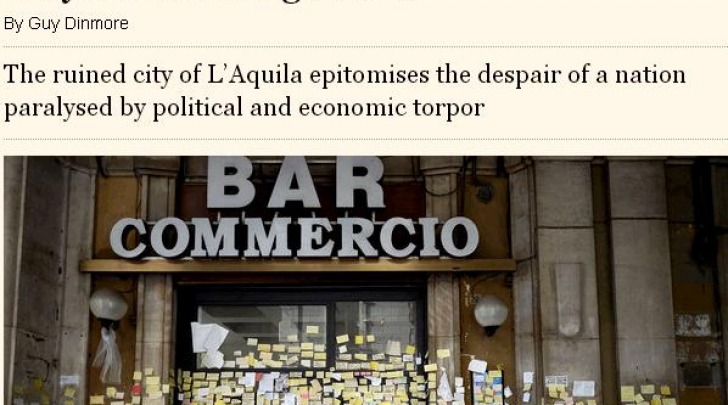L'Aquila, per il Financial Times è il simbolo della stasi dell'Italia
Il Financial Times parla di Italia, della sua crisi, dello stato di paralisi, della recessione più lunga dai tempi della guerra. E usa a paradigma di tutto ciò L'Aquila.
Parafrasando il titolo di un noto film, l'articolo firmato da Guy Dinmore sul principale giornale economico-finanziario del Regno Unito, titola "Italy: Lost in stagnation" e parla per un lungo pezzo di articolo dell'Aquila.
L'Aquila che Dinmore definisce "the ultimate symbol of Italy’s great stagnation".
Qui di seguito la parte relativa all'Aquila dell'articolo presente all'indirizzo http://www.ft.com/cms/s/0/e7f43eac-a775-11e2-bfcd-00144feabdc0.html#axzz2QvHh52VI
"Silence hangs over the ruins of L’Aquila when 83-year-old Aldo Di Bitonto returns to inspect his shattered home. It is the fourth anniversary of the earthquake that devastated the city and he does not know when or even if he will cross the threshold of his home again.
Reconstruction has all but ground to a halt, through lack of money and paralysing politics that have made medieval L’Aquila the ultimate symbol of Italy’s great stagnation.
“We are in the hands of incompetent, arrogant and conceited politicians who count for nothing. The right speaks badly of the left, the left of the right and we the people are caught in the middle like pressed fish,” laments Mr Di Bitonto, captain of the city’s football team half a century ago, strolling through the deserted “red zone” of the historic centre. Steel girders prop up teetering buildings and churches, and some streets are still entirely closed off.
Candles and fresh flowers mark the places where 309 people were killed as they slept in L’Aquila and nearby villages in the early hours of April 6, 2009. Some 22,000 left homeless are still in “temporary” accommodation.
Massimo Cialente, L’Aquila’s despairing mayor, is threatening to haul down the national flag from the city hall and dismiss the prefect representing the central government. “You can let us die in peace,” he says. “This city has been condemned to death without resources.”
Despite an outpouring of grief and hand-wringing pledges by national leaders, L’Aquila has become a monument to Italy’s economic and political paralysis. Small construction companies won tenders to rebuild, started work and then went bankrupt when the state failed to pay them – a pattern that is repeated across the country where the public administration owes €100bn in arrears to the private sector.
But, like the rest of Italy, L’Aquila is rich in suffocating bureaucratic impositions. Gian Antonio Stella, a reporter known for exposing the waste and corruption of the elite known as the “caste”, counts 1,109 laws, directives and ordinances passed to deal with the city’s revival. Some aim to prevent the Mafia – one branch of the Italian economy that is flourishing amid crisis – from taking the spoils of reconstruction.
Families are still lodged in a police barracks outside the city that were used to host the 2009 G8 summit after Silvio Berlusconi, then prime minister, shifted the venue to L’Aquila, ostensibly to draw attention to its plight. The summit budget, Mr Stella notes, included €26,000 for 60 limited edition pens and €22,500 for 45 silver Bulgari ashtrays.
Beyond L’Aquila, Italy’s crisis is deepening as the economy enters its eighth consecutive quarter of contraction, the longest recession since the war. In the decade to the end of 2012, the eurozone’s third-largest economy recorded 15 quarters of decline....."

















